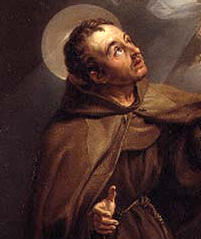15. So when they had dined, Jesus says to Simon Peter, Simon, son of Jonas, love you me more than these? He says to him, Yea, Lord; you know that I love you. He says to him, Feed my lambs.
16. He says to him again the second time, Simon, son of Jonas, love you me? He says to him, Yea, Lord; you know that I love you. He says, to him, Feed my sheep.
17. He says to him the third time, Simon, son of Jonas, love you me? Peter was grieved because he said to him the third time, Love you me? And he said to him, Lord, you know all things you know that I love you. Jesus says to him, Feed my sheep.
THEOPHYL. The dinner being ended, He commits to Peter the superintendence over the sheep of the world, not to the others: So when they had dined, Jesus says to Simon Peter, Simon, son of Jonas, Do love you Me more than these do?
AUG. Our Lord asked this, knowing it: He knew that Peter not only loved Him, but loved Him more than all the rest.
ALCUIN. He is called Simon, son of John, John being his natural father. But mystically, Simon is obedience, John grace, a name well befitting him who was so obedient to God's grace, that he loved our Lord more ardently than any of the others. Such virtue arising from divine gift, not mere human will.
AUG. While our Lord was being condemned to death, he feared, and denied Him. But by His resurrection Christ implanted love in his heart, and drove away fear. Peter denied, because he feared to die: but when our Lord was risen from the dead, and by His death destroyed death, what should he fear? He says to Him, Yea, Lord; you know that 1 love You. On this confession of his love, our Lord commends His sheep to him: He says to him, Feed My lambs. as if there were no way of Peter's showing his love for Him, but by being a faithful shepherd, under the chief Shepherd.
CHRYS. That which most of all attracts the Divine love is care and love for our neighbor. Our Lord passing by the rest, addresses this command to Peter: he being the chief of the Apostles, the mouth of the disciples, and head of the college. Our Lord remembers no more his sin in denying Him, or brings that as a charge against him, but commits to him at once the superintendence over his brethren. If you love Me, have rule over your brethren, show forth that love which you have evidenced throughout, and that life which you said you would lay down for Me, lay down for the sheep.
He says to him again the second time, Simon, son of Jonas, love you Me? He says to Him, Yea, Lord; you know that I love You. Well does He say to Peter, Love you Me, and Peter answer, Amo Te, and our Lord replies again, Feed My lambs. Whereby, it appears that amor and dilectio are the same thing: especially as our Lord the third time He speaks does not say, Diligis Me, but Amas Me.
He says to him the third time, Simon, son of Jonas, love you Me? A third time our Lord asks Peter whether he loves Him. Three confessions are made to answer to the three denials; that the tongue might show as much love as it had fear, and life gained draw out the voice as much as death threatened.
CHRYS. A third time He asks the same question, and gives the same command; to show of what importance He esteems the superintendence of His own sheep, and how He regards it as the greatest proof of love to Him.
THEOPHYL. Thence is taken the custom of threefold confession in baptism.
CHRYS. The question asked for the third time disturbed him: Peter was grieved because He said to him the third time, Love you Me? He was afraid perhaps of receiving a reproof again for professing to love more than he did. So he appeals to Christ Himself: And he said to Him, Lord, you know all things, i.e. the secrets of the heart, present and to come.
AUG. He was grieved because he was asked so often by Him Who knew what He asked, and gave the answer. He replies therefore from his inmost heart; you know that I love You.
AUG. He says no more, He only replies what he knew himself; he knew he loved Him; whether any else loved Him he could not tell, as he could not see into another's heart: Jesus says to him, Feed My sheep; as if to say, Be it the office of love to feed the Lord's flock, as it was the resolution of fear to deny the Shepherd.
THEOPHYL. There is a difference perhaps between lambs and sheep. The lambs are those just initiated, the sheep are the perfected.
ALCUIN. To feed the sheep is to support the believers in Christ from falling from the faith, to provide earthly sustenance for those under us, to preach and exemplify withal our preaching by our lives, to resist adversaries, to correct wanderers.
AUG. They who feed Christ's sheep, as if they were their own, not Christ's, show plainly that they love themselves, not Christ; that they are moved by lust of glory, power, gain, not by the love of obeying, ministering, pleasing God. Let us love therefore, not ourselves, but Him, and in feeding His sheep, seek not our own, but the things which are His. For whoso loves himself, not God, loves not himself: man that cannot live of himself, must die by loving himself; and he cannot love himself, who loves himself to his own destruction. Whereas when He by Whom we live is loved, we love ourselves the more, because we do not love ourselves; because we do not love ourselves in order that we may love Him by Whom we live
AUG. But unfaithful servants arose, who divided Christ's flock, and handed down the division to their successors: and you hear them say, Those sheep are mine, what seek you with my sheep, I will not let you come to my sheep. If we call our sheep ours, as they call them theirs, Christ has lost His sheep.
18. Verily, verily, I say to you, When you were young, you girded yourself, and walked where you would: but when you shall be old, you shall stretch forth your hands, and another shall gird you, and carry you whither you would not.
19a. This spoke he, signifying by what death he should glorify God.
CHRYS. Our Lord having made Peter declare his love, informs him of his future martyrdom; an intimation to us how we should love: Verily, verily, I say to you, When you were young, you girded yourself, and walked where you would. He reminds him of his former life, because, whereas in worldly matters a young man has powers, an old man none; in spiritual things, on the contrary, virtue is brighter, manliness stronger, in old age; age is no hindrance to grace. Peter had all along desired to share Christ's dangers; so Christ tells him, Be of good cheer; I will fulfill your desire in such a way, that what you has not suffered when young, you shall suffer when old: But when you are old. Whence it appears, that he was then neither a young nor an old man, but in the prime of life.
ORIGEN. It is not easy to find any ready to pass at once from this life; and so he says to Peter, When you are old, you shall stretch forth your hand.
AUG. That is, shall be crucified. And to come to this end, Another shall gird you, and carry you where you would not. First He said what would come to pass, secondly, how it would come to pass. For it was not when crucified, but when about to be crucified, that he was led where he would not. He wished to be released from the body, and be with Christ; but, if it were possible, he wished to attain to eternal life without the pains of death; to which he went against his will, but conquered by the force of his will, and triumphing over the human feeling, so natural a one, that even old age could not deprive Peter of it. But whatever be the pain of death, it ought to be conquered by the strength of love for Him, Who being our life, voluntarily also underwent death for us. For if there is no pain in death, or very little, the glory of martyrdom would not be great.
CHRYS. He says, Where you would not, with reference to the natural reluctance of the soul to be separated from the body; an instinct implanted by God to prevent men putting an end to themselves.
Then raising the subject, the Evangelist says, This spoke He, signifying by what death he should glorify God: not, should die: he expresses himself so, to intimate that to suffer for Christ was the glory of the sufferer. But unless the mind is persuaded that He is very God, the sight of Him can in no way enable us to endure death. Wherefore the death of the saints is certainty of divine glory.
AUG. He who denied and loved, died in perfect love for Him, for Whom he had promised to die with wrong haste. It was necessary that Christ should first die for Peter's salvation, and then Peter die for Christ's Gospel.
19b. And when he had spoken this, he says to him, Follow me.
AUG. Our Lord having foretold to Peter by what hat death he should glorify God, bids him follow Him. And when He had spoken this, He says to him, Follow Me. Why does He say, Follow Me, to Peter, and not to the others who were present, who as disciples were following their Master? Or if we understand it of his martyrdom, was Peter the only one who died for the Christian truth? Was not James put to death by Herod? Some one will say that James was not crucified, and that this was fitly addressed to Peter, because he not only died, but suffered the death of the cross, as Christ did.
Catena Aurea John 21


 Paschal Baylon (named after the day of his birth and death: Pentecost Sunday—Pascha Pentekostes) was a simple, pious shepherd boy who later became an ardent spiritual son of St. Francis and the heavenly patron of adorers of the Most Blessed Sacrament. He belongs to that illustrious circle of saints who, by heroic holiness of life, refurbished the Church's crown that had been desecrated by the heretics of the sixteenth century. He hailed from the Spanish section of Valencia and died at the age of 52. As he lay dead upon the bier, he opened and closed his eyes twice when the sacred species were elevated at the consecration. Leo XIII declared him the heavenly patron of all Eucharistic leagues and societies.
Paschal Baylon (named after the day of his birth and death: Pentecost Sunday—Pascha Pentekostes) was a simple, pious shepherd boy who later became an ardent spiritual son of St. Francis and the heavenly patron of adorers of the Most Blessed Sacrament. He belongs to that illustrious circle of saints who, by heroic holiness of life, refurbished the Church's crown that had been desecrated by the heretics of the sixteenth century. He hailed from the Spanish section of Valencia and died at the age of 52. As he lay dead upon the bier, he opened and closed his eyes twice when the sacred species were elevated at the consecration. Leo XIII declared him the heavenly patron of all Eucharistic leagues and societies. .jpg)


